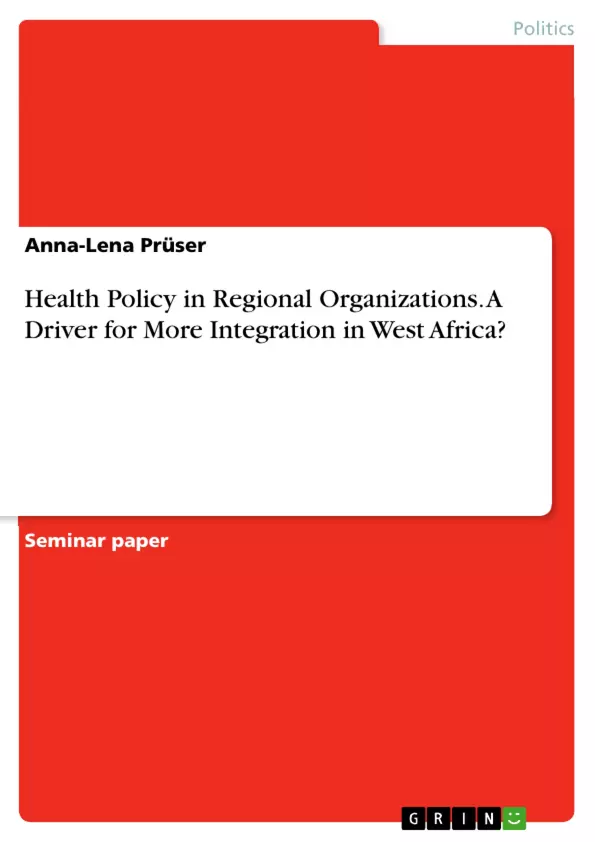As history tells us, economic development is typically identified as the driver of regional integration. Efforts to bring countries in one region together have been going on for several decades and both, experience and theory, encourage the potential of economic development for regional cooperation. The European Union is the prime example: the establishment of the European Coal and Steel Community in 1952 was the basis for a common market for these resources and this idea of free movement was transferred to all goods, services, capital and labour in the subsequent decades.
Parallel to that, the development of global regimes, such as the World Trade Organizations’ legal framework, stimulated developing countries to form their own regional organizations in order to keep up with trade liberalization.
Inhaltsverzeichnis (Table of Contents)
- Regional integration in West Africa
- The West African Ebola virus epidemic
- Barriers to an integrated health policy in West Africa
- Benefits of an integrated health policy in West Africa
- The right way forward for West African health policy
Zielsetzung und Themenschwerpunkte (Objectives and Key Themes)
This essay examines the role of health policy in promoting regional integration in West Africa. It assesses the impact of the Ebola virus epidemic on regional cooperation and explores the challenges and opportunities associated with developing an integrated health policy for the region.
- The importance of regional integration in West Africa
- The impact of the Ebola virus epidemic on regional health policy
- The barriers to an integrated health policy in West Africa
- The benefits of an integrated health policy in West Africa
- Strategies for developing a more effective West African health policy
Zusammenfassung der Kapitel (Chapter Summaries)
The first chapter of the essay explores the concept of regional integration in West Africa, focusing on the historical context and key challenges faced by the region. It highlights the importance of social and economic factors in driving successful integration. The second chapter examines the West African Ebola virus epidemic and its implications for regional health policy. It analyzes the response of regional organizations and explores the key factors that contributed to the success or failure of their interventions.
The third chapter delves into the barriers that hinder the development of an integrated health policy in West Africa. These include the lack of coordination and collaboration among member states, inadequate infrastructure and funding, and the dominance of national interests over regional priorities. The fourth chapter explores the potential benefits of an integrated health policy for West Africa, including improved access to healthcare, enhanced disease surveillance and control, and increased investment in health infrastructure. It highlights how a regional approach can address the challenges of cross-border health issues.
Finally, the essay examines potential strategies for advancing West African health policy. It emphasizes the need for strong political leadership, increased financial resources, and a collaborative approach to address the region's health challenges. It suggests that investing in regional institutions, promoting health diplomacy, and addressing the underlying social determinants of health can contribute to a more integrated and effective health system in West Africa.
Schlüsselwörter (Keywords)
Regional integration, West Africa, health policy, Ebola virus epidemic, health diplomacy, regional organizations, ECOWAS, WAHO, social determinants of health, health infrastructure, cross-border health issues, collaborative governance, political leadership, financial resources.
Frequently Asked Questions
Can health policy drive regional integration in West Africa?
The essay explores whether shared health challenges, such as the Ebola epidemic, can act as a catalyst for deeper cooperation among West African nations, similar to how economic factors drove European integration.
What were the lessons learned from the Ebola epidemic?
The epidemic highlighted the need for better coordination, disease surveillance, and regional health infrastructure. It showed that cross-border health issues require a collaborative rather than a purely national response.
What are the main barriers to an integrated health policy in West Africa?
Key barriers include a lack of coordination among member states, inadequate funding, poor infrastructure, and the tendency of national interests to override regional priorities.
What role do ECOWAS and WAHO play?
The Economic Community of West African States (ECOWAS) and the West African Health Organization (WAHO) are central regional institutions responsible for harmonizing health policies and managing regional health crises.
What is "Health Diplomacy"?
Health diplomacy refers to the use of health issues as a means to foster better international relations and political leadership, aiming for collaborative governance to improve regional health outcomes.
- Quote paper
- Anna-Lena Prüser (Author), 2018, Health Policy in Regional Organizations. A Driver for More Integration in West Africa?, Munich, GRIN Verlag, https://www.grin.com/document/445278



